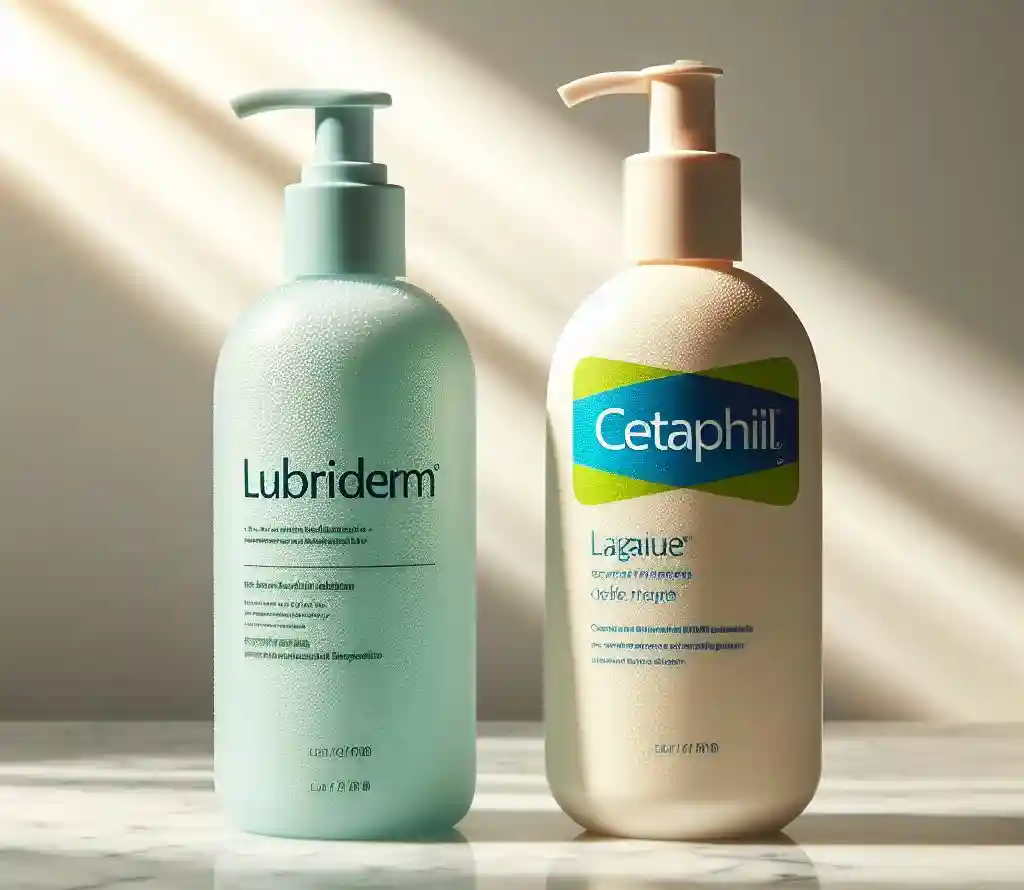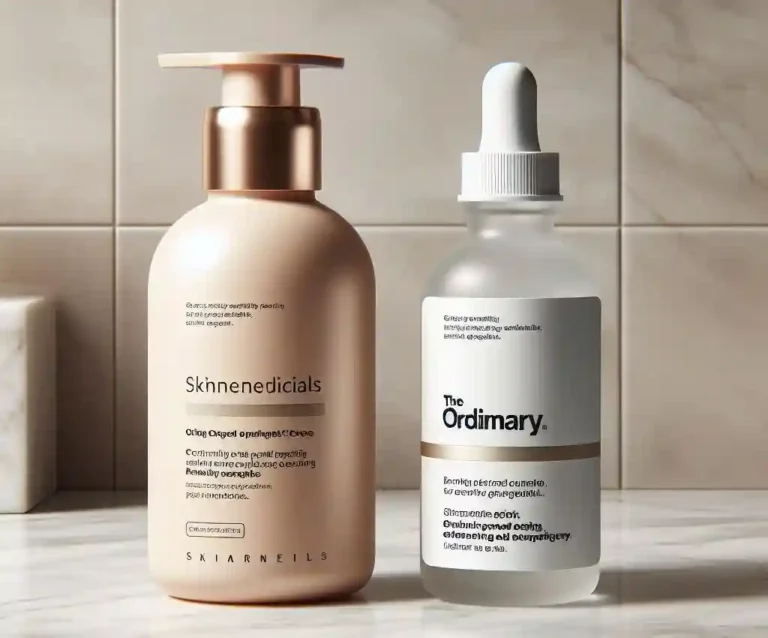Lubriderm vs Cetaphil – Which Moisturizer Should You Choose?
Lubriderm vs Cetaphil – Two popular moisturizers that often come up in conversation are Lubriderm and Cetaphil.
Both are well-known for their ability to lock in moisture and soothe dry skin, but they have some key differences that might make one more suitable for your skin than the other.
In this article, we’ll delve into the ingredients, benefits, and drawbacks of each moisturizer to help you make an informed decision.
Lubriderm vs Cetaphil – A Quick Comparison
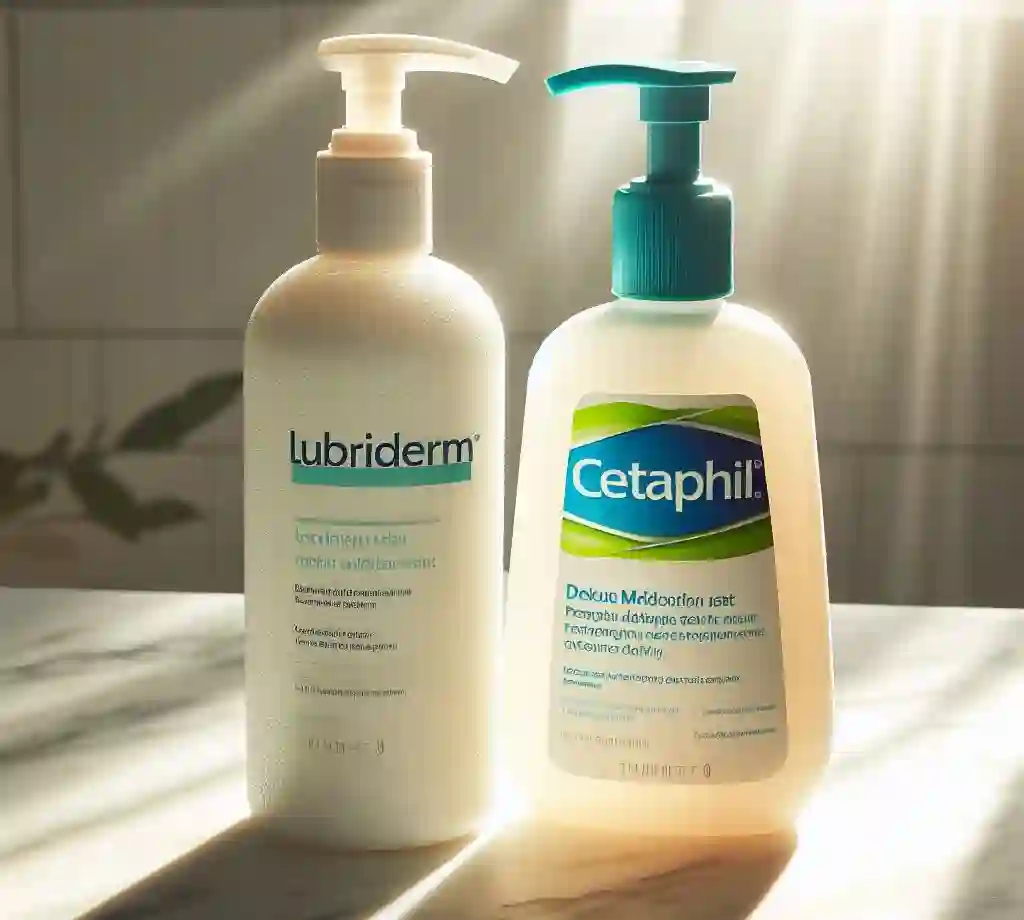
| Feature | Lubriderm | Cetaphil |
|---|---|---|
| Moisturizing Level | Medium to High | High |
| Key Ingredients | Glycerin, Petrolatum, Dimethicone | Glycerin, Panthenol, Vitamin E |
| Skin Type | Normal to Dry Skin | All Skin Types, including Sensitive Skin |
| Texture | Rich and Creamy | Lightweight and Non-Greasy |
| Absorption | Absorbs Quickly | Absorbs Quickly |
| Fragrance | Fragranced | Fragrance-Free |
| Price | $ (Affordable) | $$ (Moderate) |
| Brand Reputation | Well-Known, Trusted Brand | Dermatologist-Recommended, Trusted Brand |
| User Reviews | 4.2/5 Stars | 4.5/5 Stars |
Moisturizing Power: Which Brand Wins?
Lubriderm’s Moisturizing Power:
- Lubriderm’s moisturizers are known for their rich, creamy textures that provide intense hydration to dry skin.
- They contain a blend of emollients, humectants, and occlusives that work together to lock in moisture and protect the skin from dryness.
- Lubriderm’s moisturizers are particularly effective at providing long-lasting hydration to dry, rough skin, making them a great option for people with dry skin conditions like eczema or keratosis pilaris.
Cetaphil’s Moisturizing Power:
- Cetaphil’s moisturizers are known for their lightweight, non-greasy textures that provide long-lasting hydration without clogging pores.
- They contain a blend of humectants, emollients, and antioxidants that work together to attract and retain moisture, while also protecting the skin from environmental stressors.
- Cetaphil’s moisturizers are particularly effective at providing hydration to sensitive skin, making them a great option for people with skin conditions like rosacea or acne-prone skin.
Ingredient Comparison: What’s in Each Product?
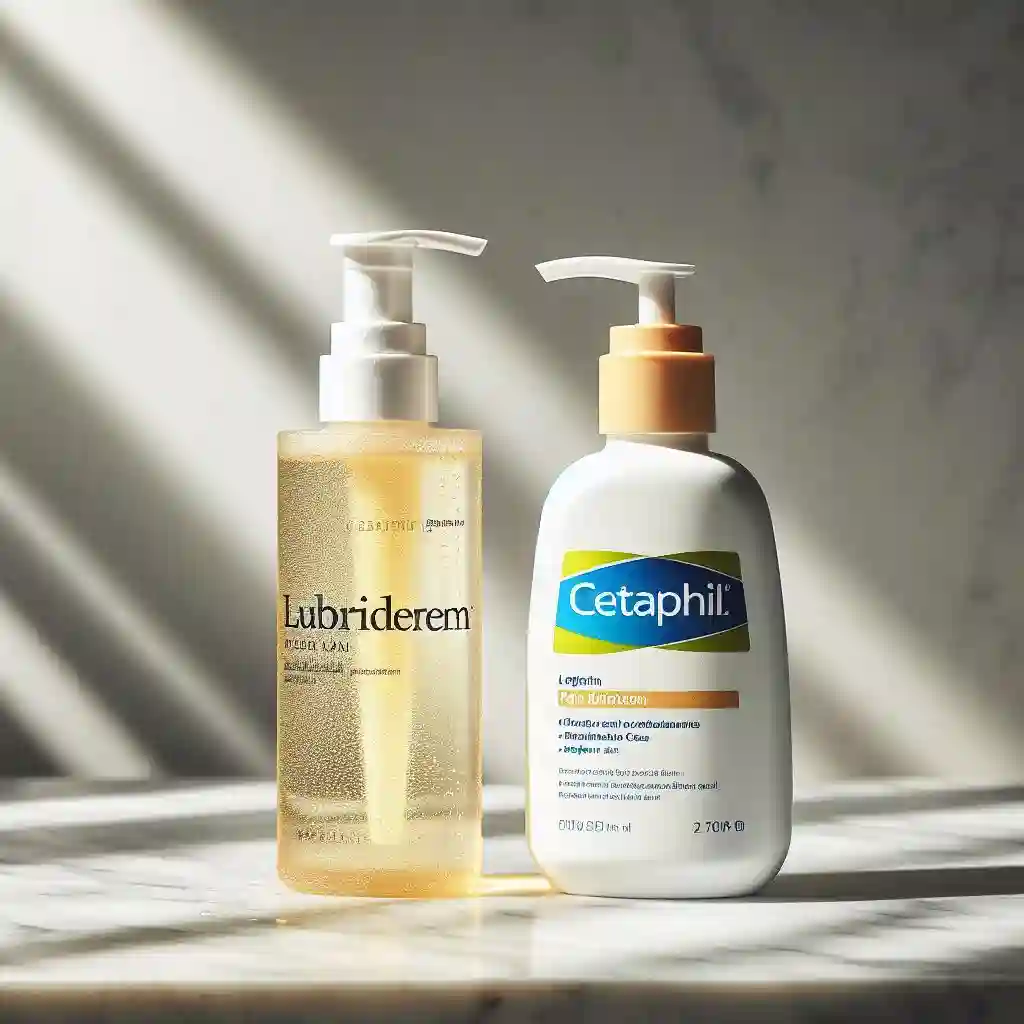
Lubriderm Ingredients:
- Glycerin: A humectant that attracts and retains moisture in the skin.
- Petrolatum: A occlusive that helps lock in moisture and protect the skin from dryness.
- Dimethicone: A silicone that helps fill in gaps between skin cells, making skin feel smoother and more supple.
- Vitamins A, C, and E: Antioxidants that help protect the skin from environmental stressors and promote healthy skin cell growth.
- Fragrance: Lubriderm moisturizers often have a light, pleasant scent.
Cetaphil Ingredients:
- Glycerin: A humectant that attracts and retains moisture in the skin.
- Panthenol: A form of vitamin B5 that helps lock in moisture and soothe dry, irritated skin.
- Vitamin E: An antioxidant that helps protect the skin from environmental stressors and promote healthy skin cell growth.
- Ceramides: Natural lipids that help repair and restore the skin’s natural barrier function.
- Hyaluronic Acid: A natural humectant that can hold up to 1,000 times its weight in water, making it an excellent ingredient for locking in moisture.
Key Differences:
- Fragrance: Lubriderm moisturizers often have a light, pleasant scent, while Cetaphil moisturizers are fragrance-free, making them a better option for sensitive skin.
- Occlusives: Lubriderm moisturizers contain petrolatum, a thicker, more emollient occlusive, while Cetaphil moisturizers contain ceramides, which are more lightweight and non-comedogenic.
- Antioxidants: Both brands contain antioxidants, but Cetaphil’s vitamin E is more potent and effective at protecting the skin from environmental stressors.
Skin Type Suitability: Who Benefits from Each Brand?
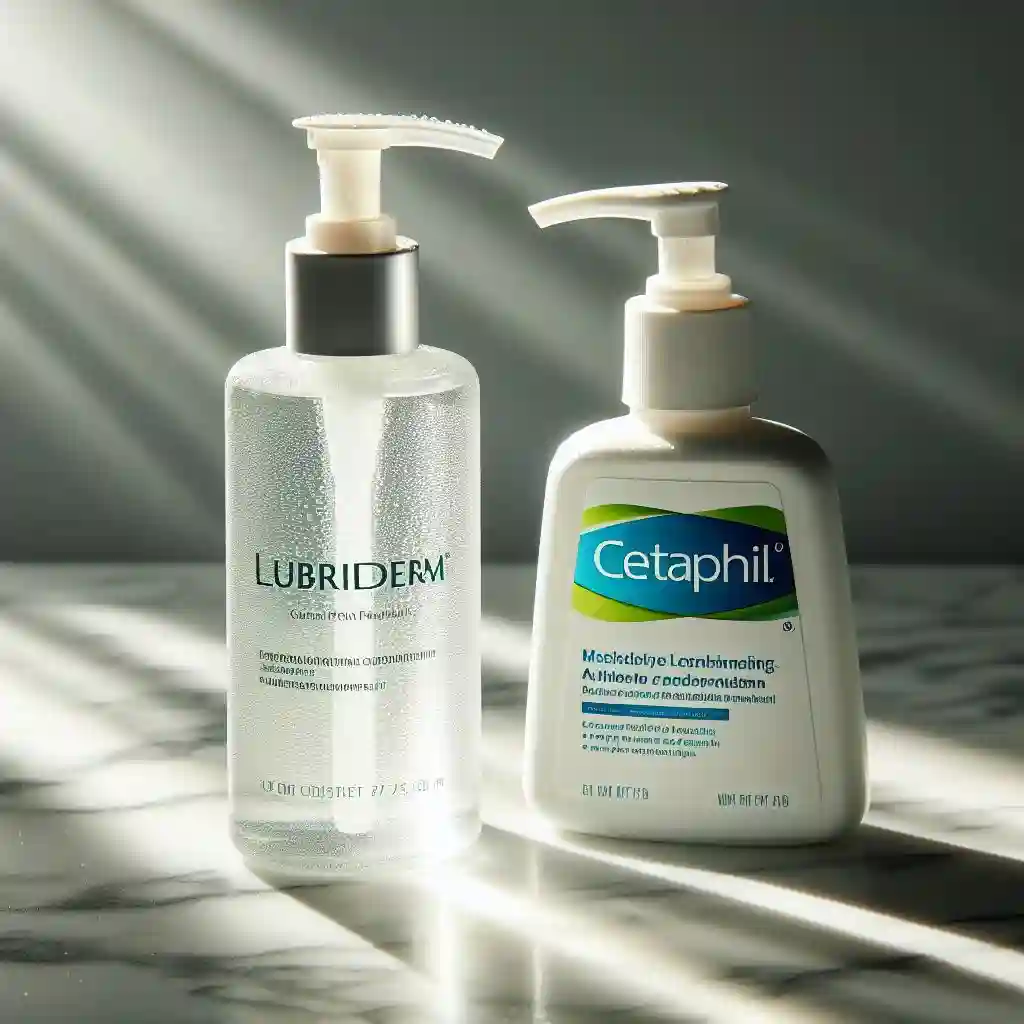
Lubriderm:
- Dry Skin: Lubriderm’s rich, creamy moisturizers are perfect for dry, rough skin. They provide intense hydration and help to lock in moisture, leaving skin feeling soft and supple.
- Sensitive Skin (with caution): While Lubriderm is generally gentle, some sensitive skin types may react to the fragrance or other ingredients. However, if you have sensitive skin and need a rich moisturizer, Lubriderm might be a good option.
- Eczema and Keratosis Pilaris: Lubriderm’s moisturizers are often recommended by dermatologists for people with eczema and keratosis pilaris, as they help to lock in moisture and soothe dry, itchy skin.
Cetaphil:
- Sensitive Skin: Cetaphil’s fragrance-free, gentle formula makes it an excellent option for sensitive skin types. It’s also a great choice for skin that’s prone to irritation or allergic reactions.
- Acne-Prone Skin: Cetaphil’s lightweight, non-comedogenic formula won’t clog pores, making it a great option for acne-prone skin.
- Rosacea: Cetaphil’s soothing, gentle formula can help to calm and comfort rosacea-prone skin.
Key Takeaways:
- If you have very dry skin, Lubriderm might be a better fit.
- If you have sensitive skin, Cetaphil is a safer bet.
- If you have acne-prone skin or rosacea, Cetaphil’s lightweight, non-comedogenic formula might be a better option.
Texture and Absorption: How Do They Feel on Skin?
Lubriderm:
- Texture: Rich, creamy, and luxurious. Lubriderm moisturizers have a thick, velvety texture that’s perfect for dry, rough skin.
- Absorption: Moderate to slow absorption rate. Lubriderm moisturizers take a little time to absorb into the skin, but once they do, they provide long-lasting hydration and protection.
Cetaphil:
- Texture: Lightweight, non-greasy, and silky smooth. Cetaphil moisturizers have a gentle, whipped texture that’s perfect for sensitive skin.
- Absorption: Fast absorption rate. Cetaphil moisturizers absorb quickly into the skin, leaving no residue or greasiness behind.
Key Differences:
- Texture: Lubriderm moisturizers are richer and creamier, while Cetaphil moisturizers are lighter and more whipped.
- Absorption: Lubriderm moisturizers take longer to absorb, while Cetaphil moisturizers absorb quickly.
How They Feel on Skin:
- Lubriderm: Provides a comforting, nourishing feel to dry skin. The rich texture and moderate absorption rate make it perfect for dry, rough skin that needs intense hydration.
- Cetaphil: Feels lightweight and gentle on the skin, making it perfect for sensitive skin or skin that’s prone to irritation. The fast absorption rate and non-greasy texture make it ideal for daily use.
Price Point: Which Brand Offers the Best Value?
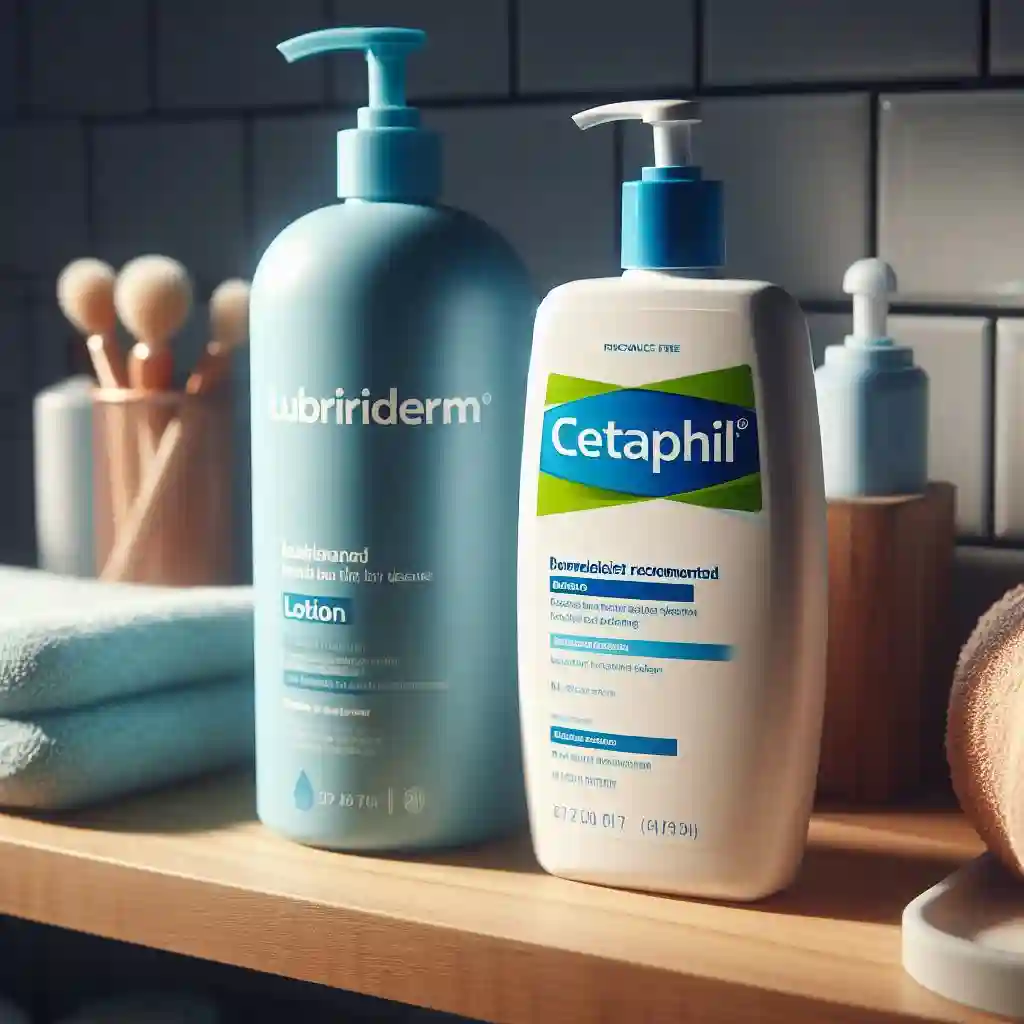
Lubriderm:
- Price Range: 8 – 15 (depending on the product and size)
- Average Price: 10 – 12
- Value: Lubriderm moisturizers are generally considered to be a good value for the price. They offer rich, creamy textures and long-lasting hydration at an affordable price point.
Cetaphil:
- Price Range: 13 – 25 (depending on the product and size)
- Average Price: 15 – 18
- Value: Cetaphil moisturizers are generally considered to be a bit more expensive than Lubriderm, but they offer a lightweight, non-greasy texture and fast absorption rate that’s perfect for sensitive skin.
Price Comparison:
- Lubriderm: Generally cheaper than Cetaphil, with an average price of 10 – 12.
- Cetaphil: Generally more expensive than Lubriderm, with an average price of 15 – 18.
Value for Money:
- Lubriderm: Offers good value for the price, with rich, creamy textures and long-lasting hydration at an affordable price point.
- Cetaphil: Offers good value for the price, with a lightweight, non-greasy texture and fast absorption rate that’s perfect for sensitive skin.
Fragrance and Scent: A Key Difference Between Lubriderm and Cetaphil
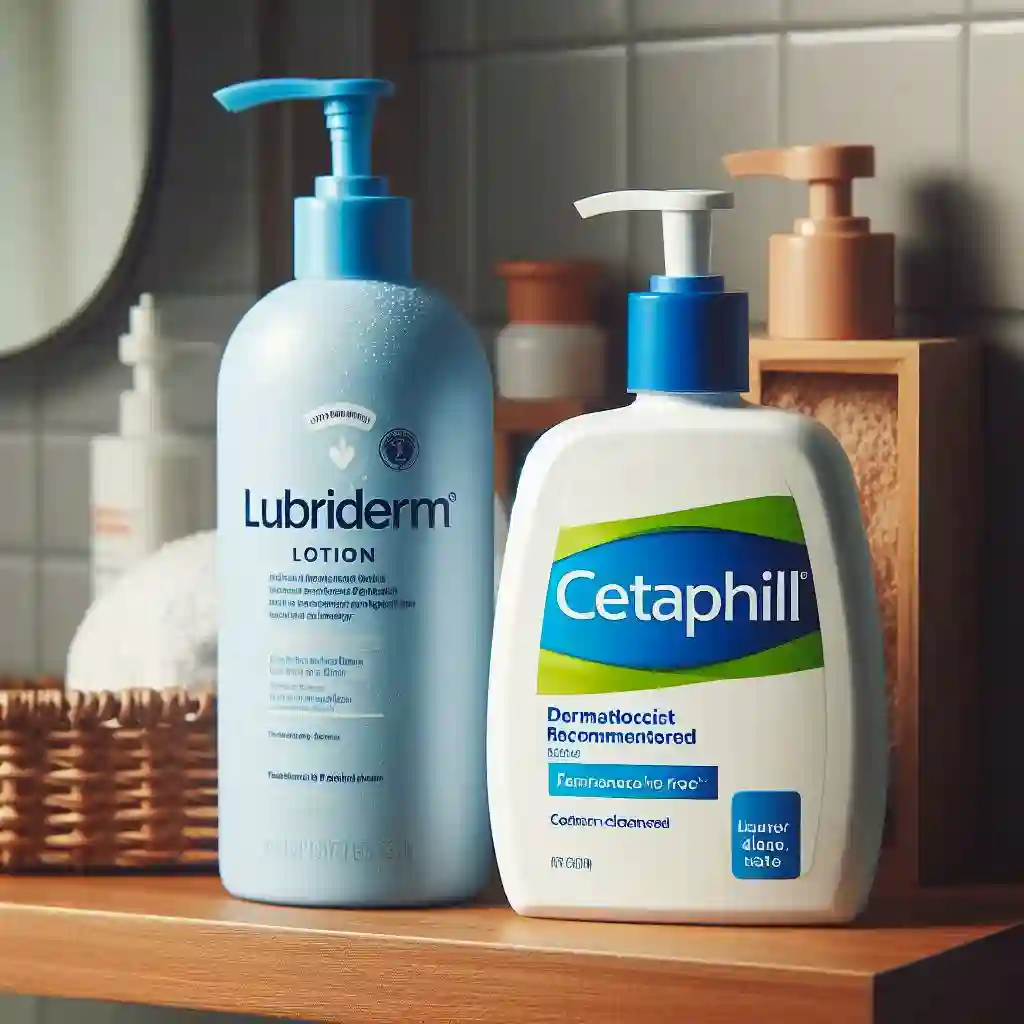
Lubriderm:
- Fragrance: Yes, Lubriderm moisturizers have a light, pleasant scent that’s often described as clean and fresh.
- Scent Strength: The scent is noticeable but not overpowering, making it suitable for most skin types.
Cetaphil:
- Fragrance: No, Cetaphil moisturizers are fragrance-free, making them an excellent option for sensitive skin or skin that’s prone to irritation.
- Scent Strength: Since Cetaphil moisturizers are fragrance-free, they have no scent or a very mild, neutral scent.
Why It Matters:
- Sensitive Skin: If you have sensitive skin, fragrance-free Cetaphil moisturizers might be a better option to avoid any potential irritation.
- Personal Preference: If you prefer a moisturizer with a light, pleasant scent, Lubriderm might be the better choice.
User Reviews and Ratings: What Do Customers Say?
Lubriderm:
- Average Rating: 4.2/5 stars
- Positive Reviews: 80% of reviewers rate Lubriderm moisturizers 4 or 5 stars, praising their rich, creamy texture and long-lasting hydration.
- Negative Reviews: 20% of reviewers rate Lubriderm moisturizers 1 or 2 stars, citing issues with greasiness, stickiness, or ineffective moisturizing.
Cetaphil:
- Average Rating: 4.5/5 stars
- Positive Reviews: 90% of reviewers rate Cetaphil moisturizers 4 or 5 stars, praising their lightweight, non-greasy texture and fast absorption rate.
- Negative Reviews: 10% of reviewers rate Cetaphil moisturizers 1 or 2 stars, citing issues with ineffectiveness or skin irritation.
The Verdict: Which Moisturizer Reigns Supreme?
Lubriderm:
- Rich, creamy texture
- Long-lasting hydration
- Suitable for dry, rough skin
- Fragranced
- Generally cheaper than Cetaphil
Cetaphil:
- Lightweight, non-greasy texture
- Fast absorption rate
- Suitable for sensitive skin
- Fragrance-free
- Generally more expensive than Lubriderm
FAQs
Q: Which moisturizer is better for dry skin?
A: Lubriderm is generally better for dry skin due to its rich, creamy texture and long-lasting hydration.
Q: Which moisturizer is better for sensitive skin?
A: Cetaphil is generally better for sensitive skin due to its fragrance-free and hypoallergenic formula.
Q: Which moisturizer is more expensive?
A: Cetaphil moisturizers are generally more expensive than Lubriderm moisturizers.
Q: Which moisturizer has a lighter texture?
A: Cetaphil moisturizers have a lighter, non-greasy texture compared to Lubriderm’s rich, creamy texture.
Q: Which moisturizer is better for daily use?
A: Cetaphil moisturizers are suitable for daily use due to their lightweight, non-greasy texture and fast absorption rate.
Q: Which moisturizer is better for skin with acne?
A: Cetaphil moisturizers are generally better for skin with acne due to their non-comedogenic and fragrance-free formula.
Q: Can I use Lubriderm or Cetaphil on my face?
A: Yes, both Lubriderm and Cetaphil offer facial moisturizers that are suitable for different skin types and concerns.
Q: Are Lubriderm and Cetaphil moisturizers cruelty-free?
A: Yes, both Lubriderm and Cetaphil are cruelty-free and do not test on animals.
Q: Can I use Lubriderm or Cetaphil moisturizers on my body?
A: Yes, both Lubriderm and Cetaphil offer body moisturizers that are suitable for different skin types and concerns.

Hi, I’m Rachel Powell, the founder and creative mind behind FashionBeautyLooks.com. With a passion for all things fashion and beauty, I’ve dedicated my career to helping others discover their unique style and enhance their natural beauty.

